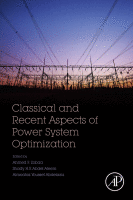Optimal power flow solution gives the best secure operating point according to certain objective functions and satisfying the operation constraints of the system. Different objective functions in power systems can be optimizely achieved. These objectives can be; the total losses of transmission lines, total generation cost, FACTS cost, voltage deviations, total of power transfer capability, voltage stability, emission of generation units, etc. The control variables of the system can be adjusted during the optimization process. These control variables including the generated active powers, the voltage of generation buses, transformer tap settings. Several classical and modern optimization techniques have been proposed to solve the optimal power flow problem. Most of classical techniques are based on the sensitivity analysis and gradient-based methods. However, different metaheuristic optimization techniques have been proposed to avoid the trapping in local optimum which can be done in the classical technique. In this chapter, a comprehensive survey about the modern optimization techniques used to solve optimal power flow problems is presented. Different optimization techniques are considered as: nature-swarm-inspired methods, human-inspired algorithms, evolutionary-inspired algorithms, physics-inspired algorithms and ANN.


